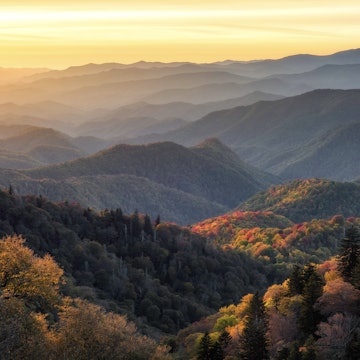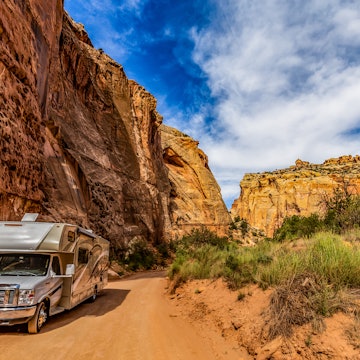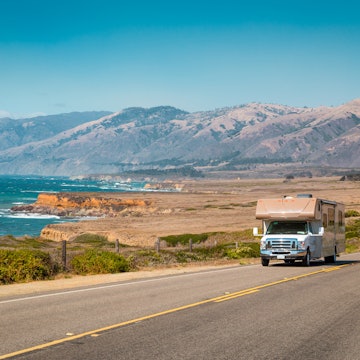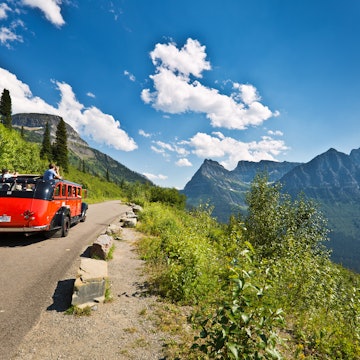

Downtown Asheville is compact and pedestrian friendly, with sidewalks connecting restaurants, hotels, shops, galleries and parks © Sean Pavone / Shutterstock
With a population of just under 100,000, Asheville is the largest city in Western North Carolina. The city is tucked within the Blue Ridge Mountains and flanked by Pisgah National Forest, however, so its regional footprint is compact.
Exploring the small downtown on foot is easy and no car is needed. But if you plan to visit the mountains and forests or venture to attractions beyond downtown, including the Biltmore Estate, you'll need your own set of wheels. City bus service is limited, there are few bike paths and there is no local train service.
Another reason for a car? The Blue Ridge Parkway. Built with drivers in mind, the Parkway is one of America’s great scenic byways. It swings past the city on its run to Great Smoky Mountains National Park.

On foot
Downtown Asheville is compact and pedestrian friendly, with sidewalks connecting restaurants, hotels, shops, galleries and parks. The walkable South Slope District is just south of the downtown core and easily reached by foot from the rest of downtown.
Pack Square Park, at Patton, Biltmore and Broadway Avenues, anchors downtown and has a visitor information center. It is also the kick-off point for the Asheville Urban Trail, a 1.7-mile self-guided walking tour that traces the history of the city at 30 downtown stops, many of them complemented by a whimsical statue or local art. Visit the Urban Trail website for a walking map. There are ten breweries in the adjacent South Slope District, which is bordered by Asheland Ave, Biltmore Ave, Southside Ave and Hilliard Ave. The breweries, galleries and restaurants here are clustered within a few blocks of each other. The South Slope Mural Trail spotlights eye-catching wall art.
About 1 1/2 miles southwest of downtown, the River Arts District encompasses 23 buildings along a one-mile stretch of the French Broad River. Due to traffic and general convenience, it is best to drive or catch an Uber, Lyft or taxi from downtown to the River Arts District, which is broken into several distinct clusters. A greenway runs alongside much of the district, but a lot of walking is required if you want to visit all the galleries. The walkable Biltmore Village and its shops and restaurants are about two miles south of downtown.

Car
For a short weekend visit in and around downtown, including South Slope and its breweries, there is no need to have a car. A quick rideshare or taxi ride will get you to fun neighborhoods within a mile or two of the city center, including the River Arts District and West Asheville. For trips to the Blue Ridge Parkway, the Biltmore Estate, Pisgah National Forest and Great Smoky Mountains National Park, however, you will need your own wheels. There are eight national rental car companies at Asheville Regional Airport.
There are more than 700 metered parking spots across downtown – which means you won't find much free street parking during the day. Metered street parking is $1.50 per hour and enforced 8am to 6pm Monday through Saturday. Most meters accept credit and debit cards. City-run parking garages, however, are free for the first hour, then $2.50 the second hour, then $1.25 for subsequent hours, or fractions thereof, with a $12 maximum per day. You can also use the Passport app to pay for metered or garage spaces.
The Blue Ridge Parkway is a 469-mile scenic byway along the crest of the Blue Ridge Mountains that curves past Asheville on its journey between Shenandoah National Park in Virginia and the east entrance of Great Smoky Mountains National Park in North Carolina. Access it from the city from four highways: US 25, US 70, US 74 and NC 191.
Bus
Asheville Rides Transit (ART) runs 18 bus routes across downtown and to outlying neighborhoods, including Haywood Rd in West Asheville and to the town of Black Mountain. Buses generally run 5:30am to 10:30pm Monday through Saturday, with reduced hours on Sunday. Tickets are $1 cash, and bus drivers cannot make change. Use of bike racks is free. Route S3 connects the downtown ART station with Biltmore Village and Asheville Regional Airport about ten times per day Monday through Friday, with fewer options on weekends.
Top tip for taking the bus: Buses do not stop at the Biltmore Estate and its vast grounds. There are no point-to-point shuttles on the Biltmore property, other than parking shuttles running from the parking lots to the mansion. You will need a car for your visit.

Trolleys & Tours
For car-free travelers interested in checking out a few tourist attractions and neighborhoods, a narrated Gray Line hop-on hop-off trolley tour may be the best option. The red trolleys stop at ten attractions across town, including Pack Square Park, the Omni Grove Park Inn, the River Arts District (north and south sections) and Biltmore Village. One ticket is good for two days, and it’s okay to hop on and off at any stop. Tickets are $35 for adults and $14 for children 5 to 11 years. The trolleys run from around 9:30am to 5:30pm, so they’re not a great option for evening sightseeing.
Most guided tours delve into one aspect of the city, from its art to its breweries to its culinary hotspots to its historic buildings. Known for their conviviality, Lazoom City Comedy Tours swing past various neighborhoods in a purple bus with a comedian as the guide. Brewery tours are by foot or by van and typically stop at three breweries, with a tasting at each one.
Taxis & Rideshare
Taxis are available in Asheville as are Uber and Lyft. If you use a taxi or rideshare service to take you to the Biltmore Estate, you will need to have them available for the duration of your visit since no estate-wide transportation is offered.

Bike
Greater Asheville offers loads of opportunities for long-distance cycling and mountain biking, but biking is not a great option currently for exploring downtown and surrounding neighborhoods. There is no bikeshare program, and there are less than 10 miles of bike lanes within the city. Part of the French Broad River Greenway, the new two-mile Wilma Dykeman Greenway runs along the east bank of the French Broad River beside the River Arts District. Another 6 miles or so of greenways are planned over the next five years. Once completed, this “River to Ridge Greenway Network” will link downtown, the River Arts District and UNC Asheville.
The Flying Bike offers guided electric-bike tours, as well as electric-bike rentals. For cycling special events and group rides, check out Asheville on Bikes.
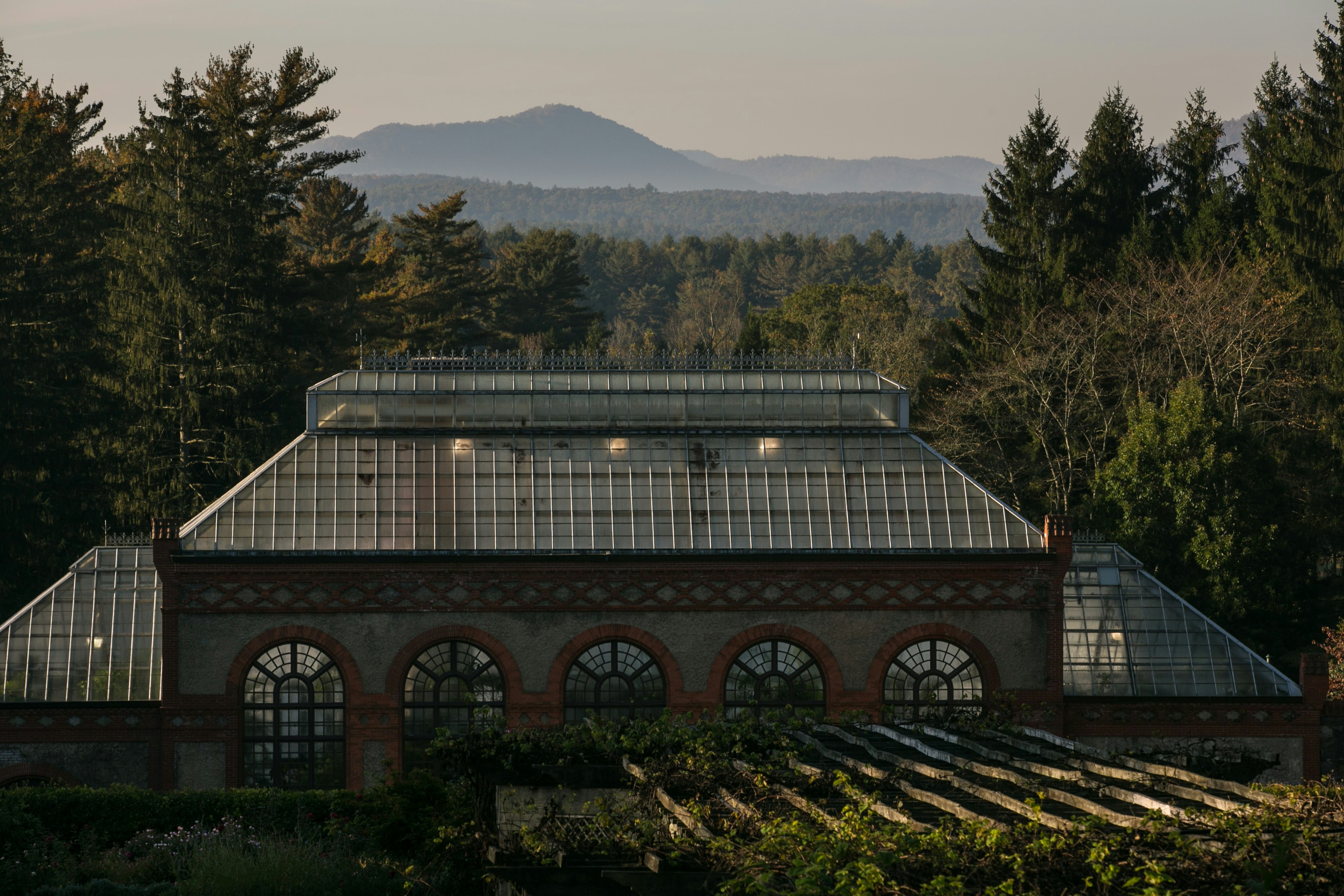
Accessible transportation in Asheville
ART buses are ADA-accessible, and they have lifts, wheelchair security areas and priority seating for riders with disabilities. Service animals are permitted on ART buses and property. Visit the ART website for more details about its ADA services. Most of the Gray Line hop-on hop-off trolleys are wheelchair accessible but call ahead, at least by the day before, to ensure the best experience. The Wilma Dykeman Greenway along the River Arts District and the French Broad River Greenway are paved and handicap-accessible. Plans are afoot at The Flying Bike for a recumbent chair bicycle, possibly available free of charge.
For adaptive outdoor recreation opportunities, check the calendar at Catalyst Sports, which leads adaptive mountain biking and rock climbing programs in the Asheville area. There are also a few accessible trails nearby on the Blue Ridge Parkway.
Download Lonely Planet’s free online guide for accessible travel online resources.
You might also like:
The best day trips from Asheville
A fall road trip through the Blue Ridge Mountains of the USA
Visit real life locations of “Three Billboards Outside Ebbing, Missouri” in North Carolina










